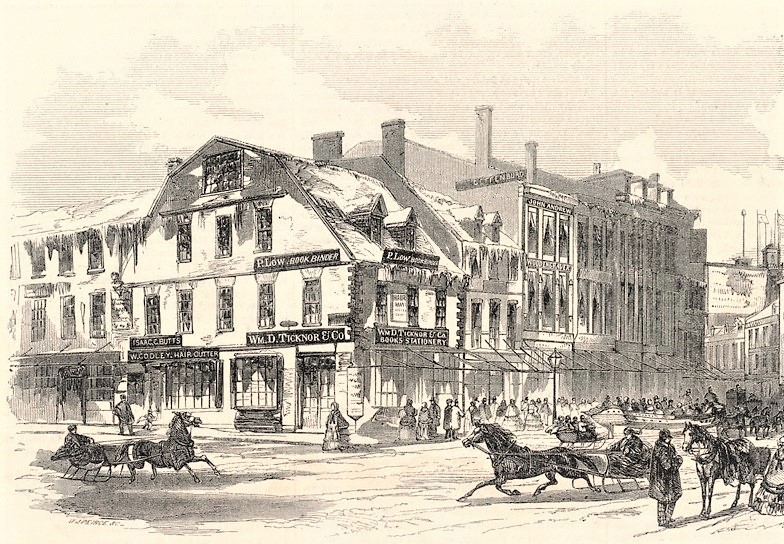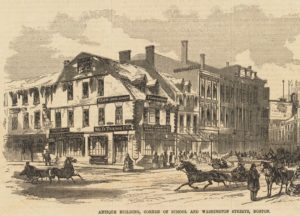
September 19, 2022 The Atlantic, Boston and the Old Corner Bookstore
In July of 2022, the Atlantic’s editor-in-chief Jeffrey Goldberg announced that the entire archive of what The Atlantic published from 1857 to 2014 is now fully digitized and available on line. The 165-year-old magazine traces its roots to the 1718 Old Corner Bookstore — the building Historic Boston Inc. (HBI) was formed to save in 1960 — and to the innovative leadership of the 19th century publisher Ticknor and Fields.

The Old Corner Bookstore at the time of Ticknor and Fields, 1857.

First Edition of the Atlantic Monthly, 1857
Begun in Boston in 1857, the Atlantic Monthly was the idea of Francis Underwood, an editorial advisor to Moses Dresser Phillips of the publishing house of Phillips and Sampson. In that year, Phillips hosted a dinner for a small group of philosophers, poets, and authors, including Ralph Waldo Emerson, Henry Wadsworth Longfellow, James Russell Lowell, and Oliver Wendell Holmes, where he announced his plan to create a new publication.
In an email to subscribers earlier this year, editor Goldberg wrote that the founding publisher and authors wanted to be “fearless and outspoken” in “a new era of human civilization.” They planned to be nonpartisan. The magazine’s founding documents were also signed by Mrs. H. Beecher Stowe, whose Uncle Tom’s Cabin was also published by Ticknor and Fields at the Old Corner Bookstore, though she reportedly boycotted the first meeting because alcohol was served.
Phillips died unexpectedly in 1859 at age 49 and the Atlantic Monthly was purchased by Ticknor and Fields and published in their building at the Old Corner Bookstore until 1863 when Ticknor and Fields sold the building and moved its operations to 124 Tremont Street. The firm continued publishing the magazine under various ownerships until 1878 when they merged with Hurd & Houghton and became Houghton, Osgood, and Co. (the future Houghton Mifflin Company in Boston).
The Atlantic was based in Boston until 2005 when it moved to Washington DC. In a 1994 reflection on the history of The Atlantic Monthly, one-time managing editor Cullen Murphy offered a taste of the monthly magazine’s important contributions to public dialogue over generations:
The Atlantic Monthly saw the first stories into print of Mark Twain, Henry James, Louise Erdrich, Sue Miller, and Bobbie Ann Mason. It was to The Atlantic Monthlythat a little-known writer named James Dickey came when he had something called Deliverance that he wanted to publish. There is distinction, too, in the realm of politics. The Atlantic Monthly was the publisher of important essays by Woodrow Wilson and Theodore Roosevelt, by W.E.B. DuBois and Martin Luther King. King sent a handwritten draft to us, written behind bars, of what would come to be known as his “Letter From Birmingham Jail,” which we published in 1963. The Atlantic Monthly is where Felix Frankfurter, in 1927, spoke out in behalf of Sacco and Vanzetti. It was the platform chosen by Al Smith, that same year, to assert the competence of a Catholic to run for national office…
The Atlantic Monthly is where war-reporting in the American press was made into an art, with dispatches from Civil War battlefields by Nathaniel Hawthorne. It is where, in the 1870s, Anna Leonowens published the remarkable chronicle of her life as tutor to the son of the King of Siam. It is where John Muir published “The American Forest,” which led to passage of the Yosemite National Park Bill, and where Jacob Riis published his first searching portrayals of the American slum…
Murphy also reflected on the magazine’s sustained relevance: “The nation was verging then, and is verging now, on a period that will fundamentally re-engrave the template by which we make sense of virtually every aspect of national reality. Perhaps now more than ever there is a role and a need for magazines that manage to combine the qualities of general-interest magazines, of political magazines, of intellectual magazines, and of literary magazines.”
Fast forward 30 years and Murphy’s words – and the Atlantic — resonate in contemporary life. The magazine still educates, enlightens, and entertains, just as its Boston founders had hoped.



